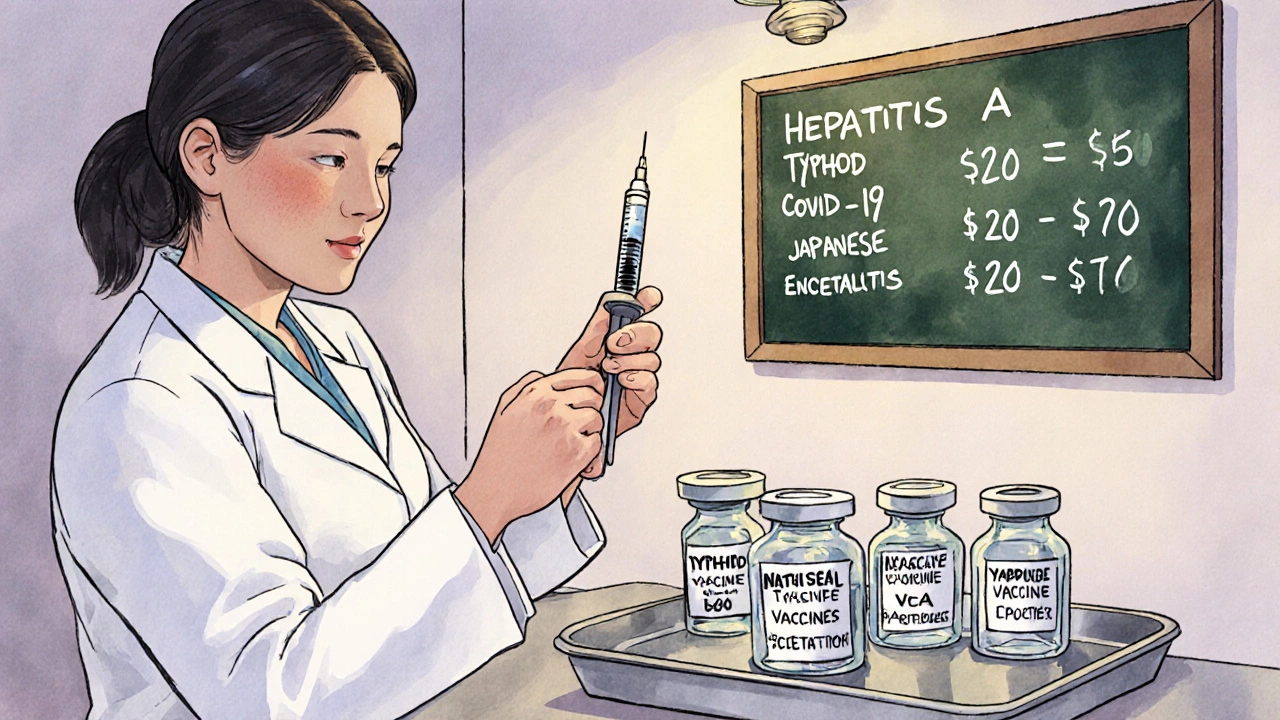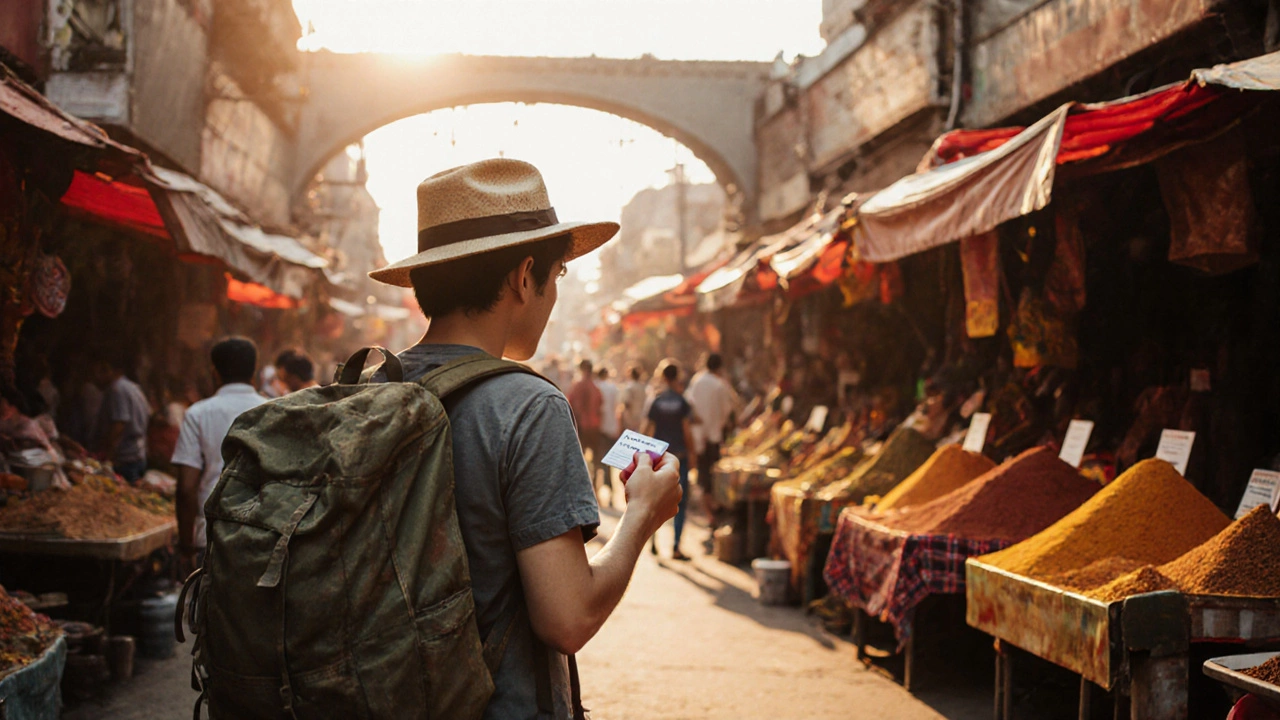India Vaccination Cost Calculator for Budget Travelers
Calculate your estimated vaccination costs for India travel based on your itinerary and budget needs. This tool helps you determine which vaccines are recommended and their approximate costs so you can make informed decisions for your journey.
$30-50 | Protects against contaminated food/water
$20-40 | Protects against contaminated food/water
$50-80 | Required only if coming from risk zone
$60-120 | Recommended for rural areas >1 month
$100-150 | Recommended for rural areas
Often free | Protects against severe illness
Key Takeaways
- India does not require mandatory vaccines for most travelers, but several are strongly recommended.
- Core vaccines (Hepatitis A, Typhoid, routine immunizations) cost between $20‑$70 and can be obtained at local travel clinics.
- Yellow Fever vaccination is only needed if you are arriving from a country with risk of the disease.
- Plan your vaccine schedule at least 4‑6 weeks before departure to allow full immunity.
- Combine vaccination with practical hygiene steps to stay healthy on a tight budget.
Traveling through India on a shoestring budget is thrilling, but health worries can turn excitement into anxiety. The big question most backpackers ask is whether they really need to spend money on vaccines before hopping on a train or a cheap flight. Below is a no‑fluff rundown that lets you decide which shots are worth the cash and how to get them without breaking the bank.
What the Indian Government Actually Requires
India does not enforce a universal vaccination mandate for foreign visitors. The only situation that triggers a legal requirement is vaccinations for India when you are arriving from a country with a documented Yellow Fever risk. In that case, you must present an International Certificate of Vaccination (the “yellow card”). For everyone else, the Ministry of Health recommends a set of vaccines based on the regions you’ll visit and activities you’ll undertake.
Core Vaccines Most Travelers Should Consider
Even if they aren’t compulsory, five vaccines consistently appear on the advice list for budget travelers:
- Hepatitis A
- Typhoid
- Routine immunizations (MMR, DTaP, Polio)
- COVID‑19 booster (if your home country’s schedule is outdated)
- Japanese Encephalitis (if you will stay longer than a month in rural areas)
These shots protect against diseases that are common in crowded markets, street food stalls, and rural villages.

Vaccine Profiles and Cost Breakdown
| Vaccine | Required? | Typical Cost (USD) | Doses | Immunity Onset |
|---|---|---|---|---|
| Hepatitis A | Strongly recommended | 30‑50 | 2 (6‑12 months apart) or single‑dose | 2‑4 weeks |
| Typhoid | Strongly recommended | 20‑40 | 1 (injectable) or 2 (oral) | 1‑2 weeks |
| Yellow Fever | Required only from risk zones | 50‑80 | 1 | 10 days |
| Japanese Encephalitis | Optional / high‑risk | 60‑120 | 2 (0 & 28 days) | 1‑2 weeks after 2nd dose |
| Rabies (pre‑exposure) | Optional / wildlife exposure | 100‑150 | 3 (0, 7, 21‑28 days) | 2‑4 weeks |
| COVID‑19 Booster | Strongly recommended | Varies (often free) | 1 | 2 weeks |
Where to Get Your Shots Without Overspending
Most major cities in New Zealand, Australia, and Southeast Asia host travel health clinics that specialize in budget‑friendly packages. A quick online search for “travel health clinic” plus your city will pull up options. Look for clinics that bundle Hepatitis A and Typhoid together; they often charge a combined fee that’s cheaper than two separate appointments.
If you’re already in India, reputable private hospitals in Delhi, Mumbai, and Bangalore offer vaccine services at local rates-usually 30‑40% lower than Western prices. However, bring a copy of your vaccination record and verify that the facility follows WHO‑approved protocols.
Timing Your Vaccinations
Vaccines need time to build immunity, so planning ahead is crucial. Here’s a simple timeline:
- Start researching 2‑3 months before departure.
- Book an appointment at a travel clinic at least 6 weeks ahead for multi‑dose series (e.g., Hepatitis A, Japanese Encephalitis).
- If you only need single‑dose shots (Yellow Fever, COVID‑19 booster), a 2‑week window is sufficient.
- Keep the International Certificate of Vaccination safely in your travel folder.
Missing this window can force you to delay your trip or pay premium last‑minute fees.

Alternative Safety Measures If You Skip Some Shots
Skipping a vaccine isn’t a death sentence, but it does raise your risk. Pairing smart habits with selective immunizations can keep you safe:
- Food & water vigilance: Stick to boiled or filtered water, avoid raw salads washed with tap water, and eat cooked foods that are served hot.
- Insect protection: Use DEET‑based repellents, wear long sleeves after dusk, and sleep under a mosquito net in rural lodges.
- Wound care: Clean any animal bite or scratch immediately with soap and antiseptic; seek medical help within a few hours.
These low‑cost habits can dramatically lower the chance of catching diseases like Typhoid or Japanese Encephalitis.
Quick Pre‑Departure Health Checklist
- Verify your routine vaccines are up‑to‑date (MMR, DTaP, Polio).
- Decide which of the core vaccines you need based on itinerary and budget.
- Schedule appointments at a travel clinic at least 6 weeks before leaving.
- Order a travel health kit (hand sanitizer, oral rehydration salts, basic first‑aid).
- Print your International Certificate of Vaccination and keep a digital copy.
Frequently Asked Questions
Do I need a Yellow Fever vaccine to enter India?
Only if you are arriving from a country where Yellow Fever is endemic. In that case, you must present a valid International Certificate of Vaccination. Travelers from non‑risk countries do not need the shot.
Is the Hepatitis A vaccine worth the cost?
Yes. Hepatitis A spreads through contaminated food and water-a common issue in street‑food markets. The single‑dose vaccine provides protection for at least 10 years and costs around $30‑$50, making it a smart, budget‑friendly investment.
Can I get the Typhoid vaccine in India?
Yes. Private hospitals in Delhi, Mumbai, and Bangalore offer both injectable and oral Typhoid vaccines at roughly 30% less than overseas prices. Bring your vaccination record and ask for a WHO‑approved certificate.
What if I can’t afford the Japanese Encephalitis vaccine?
Focus on mosquito bite prevention: wear long sleeves, use DEET repellent, and sleep under nets. If you’ll be in high‑risk rural areas for more than a month, try to save for at least one dose, as it can reduce severe illness by up to 90%.
Do I need a Rabies pre‑exposure shot in India?
Rabies is rare in urban centers but more common in rural regions where stray dogs roam. If you plan to trek, volunteer with animals, or spend extended time in remote villages, a pre‑exposure series (three shots) is advisable. Otherwise, post‑exposure treatment is available at major hospitals if you get bitten.
Wrapping Up: Make an Informed, Money‑Smart Decision
Vaccinations for India are not a one‑size‑fits‑all requirement; they’re a set of tools you can pick based on where you go, how long you stay, and how tight your budget is. By prioritizing Hepatitis A, Typhoid, and a COVID‑19 booster, scheduling them early, and pairing them with vigilant food‑and‑bug habits, you can travel confidently without splurging on every optional shot. Stay healthy, stay curious, and keep your adventure on track.
Safe travels!
